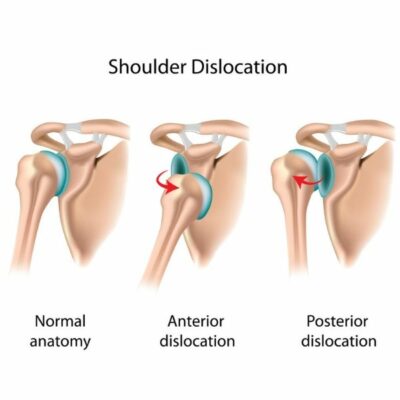Dislocated Shoulder Specialist

Are you an athlete who participates in contact sports? If so, you may be at risk of sustaining a shoulder dislocation. A shoulder dislocation, also called shoulder subluxation can occur from a sports injury, traumatic blow to the shoulder or from continuous overhead movements. Dislocated shoulder doctor, Dr. James Mazzara provides diagnosis and both surgical and nonsurgical treatment options for patients in Manchester, South Windsor, Enfield, Glastonbury and surrounding Hartford communities who have dislocated their shoulder. Contact Dr. Mazzara’s team today!
Does shoulder instability result from a dislocated shoulder?
What Causes a Dislocated Shoulder and Shoulder Instability?
The shoulder joint is the most mobile joint in the body, allowing the arm to move in many directions. Mobility however, sometimes comes at a cost; it makes the joint inherently unstable and one of the easiest joints to dislocate. A dislocated shoulder occurs when the ball and socket within the shoulder become separated. Joint separation can happen in any direction: forward, backward or downward. Most commonly caused by trauma, a dislocated shoulder can happen from a fall, a direct hit or an automobile accident. Dr. James Mazzara, serving Manchester, South Windsor, Enfield, Glastonbury and surrounding Hartford communities, has extensive training and experience in working with patients who have experienced a dislocated shoulder.
Once a patient has been treated for a dislocated shoulder, they are more prone to shoulder instability or recurring joint separation. This is because the ligaments weaken with the injury and the shoulder becomes unstableThe ligaments may stretch and never heal normally. A dislocation can result in a tear of the labrum. This results in further shoulder instability and an increased tendency for repeated dislocations. When the cartilage tears, it’s called a Bankart lesion. Fractures may also occur from a dislocation; these are called Hills Sachs lesions or Hills Sachs fractures.
Patients at risk for this are athletes involved in contact sports such as football, basketball and hockey. Continuous overhead movements in volleyball, tennis and baseball players can also lead to shoulder instability and joint dislocation. Patients over 40 years old who dislocated their shoulder may even tear their rotator cuff.
What are the Symptoms of a Dislocated Shoulder?
- Pain – Significant pain that can often be felt along the arm as well as in the shoulder.
- Muscle spasms
- A visibly displaced shoulder
- Inability or difficulty in moving the arm from its current position
- A “Popping” sensation or sound.
- Numbness in the arm
- Shoulder weakness
A dislocated shoulder can also provoke systemic symptoms such as nausea, lightheadedness, vomiting and sweating. Prompt medical treatment should be sought for any suspected joint dislocation. Patients should not attempt to return the shoulder to it’s normal position (also known as reduction) but should see a specialist who will use several methods to manually manipulate the dislocated joint and put the ball back into the socket. The reduction often minimizes pain immediately when completed properly.
What is the Treatment for Shoulder Dislocation and Shoulder Instability?
Once the joint is relocated, Dr. Mazzara will assess the patient’s full range of motion, obtain X-rays an MRI and other diagnostic tests to determine the extent of shoulder instability caused from the injury.
Non-Surgical Treatment
Dr. Mazzara may immobilize the injury by placing the arm in a sling or other device for several weeks to allow healing. A combination of ice, rest and eventually, physical therapy-to help strengthen the shoulder joint-will be recommended.
Surgical Treatment
Some cases of shoulder instability or dislocations may require minimally invasive or open surgery, for more severe damage. Dr. Mazzara recommends arthroscopic surgery for many patients and can perform this procedure for the patients in Manchester, South Windsor, Enfield, Glastonbury and surrounding Hartford communities. Arthroscopic surgery has been proven to be highly effective in repairing shoulder instability and returning patients to their normal activities in a shorter amount of time
For more information regarding a dislocated shoulder and shoulder instability, or to learn more about arthroscopic shoulder surgery as a shoulder dislocation treatment option, please contact Dr. James Mazzara, shoulder specialist, serving Manchester, South Windsor, Enfield, Glastonbury and surrounding Hartford Connecticut communities.
